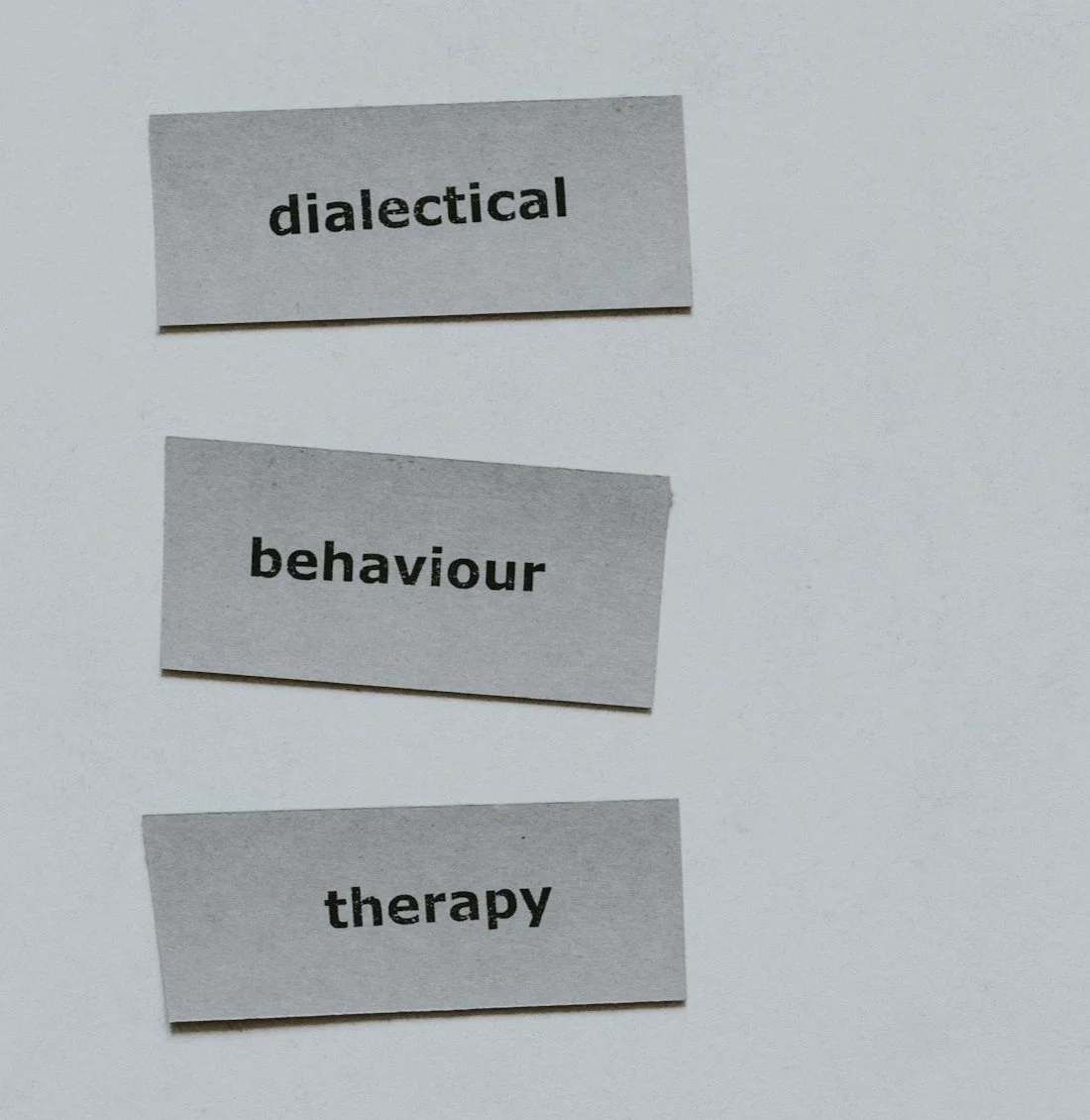
Mental Health Support
Explore my personally developed selection of mental health resources and tools, designed to support your journey toward emotional wellness and inner fulfilment.
Emotional Regulation with DBT
Dialectical Behaviour Therapy (DBT) provides a structured and practical approach to better understanding and managing our emotions. Whether you're dealing with overwhelming feelings or striving for greater emotional resilience, DBT offers valuable tools to help you navigate your emotional world more effectively.
The key steps in DBT’s emotional regulation skills, include identifying emotions accurately, assessing whether they fit the facts, and determining if they are helpful in the moment, or in achieving long-term goals. Then we try to apply strategies like problem solving, opposite action or distress tolerance to manage our emotional well-being and build healthier relationships.
By developing emotional awareness and applying appropriate techniques, we can gain greater control over our emotional responses and enhance our quality of life.
The Power of Self-Evaluation
Self-evaluation is a vital tool for understanding ourselves, shaping our identity, and fostering resilience. It involves reflecting on strengths and areas for growth, helping us maintain a balanced view of self-worth. When self-worth relies too heavily on one aspect, such as relationships, appearance, or career, we become vulnerable to setbacks in those areas. Tools like the Self-Evaluation Pie encourage a holistic approach by visualizing how we allocate time and energy across different areas of life, promoting balance and reducing the impact of challenges. By broadening our focus, diversifying our sources of self-worth, and building supportive networks, we can achieve a healthier, more resilient sense of self.
Chicken Soup Theory
Have you ever noticed how being unwell can sometimes have unexpected benefits? You’re curled up in bed, someone brings you a warm bowl of chicken soup, and for a moment, the world slows down while your needs take priority. It’s comforting to be cared for, but for others, it can be unsettling to lose the independence they’re used to. The "Chicken Soup Theory" explores how vulnerability can sometimes lead to hidden rewards.
Reframing Catastrophic Thinking
Dice Theory offers a creative way to challenge catastrophic thinking by encouraging us to envision multiple possible outcomes, akin to the sides of a die. By expanding our perspective beyond the worst-case scenario and exploring a spectrum of possibilities, this approach fosters cognitive flexibility, reduces anxiety, and builds resilience. Through steps like identifying catastrophic thoughts, brainstorming alternatives, and metaphorically rolling the dice, we can reframe rigid, negative narratives and cultivate a more balanced mindset.
Values and Actions
We meticulously budget our money, ensuring it aligns with our priorities—but what about our time? Time is our most valuable resource, yet we often let it slip away on distractions that don’t reflect what truly matters. By tracking, assessing, and consciously reallocating our time, we can align our daily actions with our core values, leading to a more intentional and fulfilling life.
A Spoonful of Energy
Ever feel like certain people or tasks completely drain your energy, while others leave you feeling refreshed? Spoon Theory, a simple yet powerful concept introduced by Christine Miserandino, helps explain how emotional energy is a limited resource—especially for those who are neurodivergent or managing chronic conditions.
By understanding spoon givers (activities that restore energy) and spoon takers (tasks that deplete it), you can plan your day more effectively, prioritise self-care, and avoid burnout. Whether it’s managing work, relationships, or daily tasks, learning how to balance your spoons can lead to a more sustainable and fulfilling life.
Ready to take control of your energy? Discover how Spoon Theory can help you navigate life with greater awareness and less overwhelm.
Post Breakup
After a breakup, rebuilding confidence means viewing it as a chance to reconnect with ourselves and refocus on self-growth rather than idealised fantasies or dependency on others. Embracing vulnerability, cultivating an abundance mindset, and understanding our true worth are key to forming healthier relationships. By nurturing passions and focusing on self-acceptance, we shift from seeking external validation to finding fulfillment and resilience within ourselves.
Love Languages: Personalising Communication
The concept of love languages highlights the unique ways individuals express and receive love. These five styles—Words of Affirmation, Quality Time, Receiving Gifts, Acts of Service, and Physical Touch—reflect how we feel valued in relationships.
Each person’s emotional needs differ. While one partner may feel cherished by heartfelt words, another might value shared time or thoughtful gestures. Misunderstandings can arise if these differences aren’t acknowledged. For instance, you might feel unappreciated when your efforts go unnoticed or struggle to connect if your partner’s expression of love doesn’t align with your expectations.
By recognising and adapting to your partner’s love language, you can foster deeper emotional intimacy and strengthen your relationship. Understanding these styles not only enhances communication but also nurtures genuine connections tailored to individual preferences.
Attribution Error
The quote “We don’t judge a fish by its ability to climb a tree” highlights the importance of respecting individual abilities and limitations, avoiding unrealistic expectations of others. Attribution theory helps us interpret others' actions by considering intent, awareness, and capacity, which can lead to more empathetic and accurate responses. By acknowledging possible misunderstandings, unintentional errors, or personal limitations, we can approach relationships with compassion and build healthier connections free from misattributed motives or undue expectations.
Decision Making
A decisional balance sheet is a structured tool to weigh the pros and cons of making a change versus staying the same, helping you evaluate all aspects of a potential decision. By examining the benefits and drawbacks of both options, reflecting on values, and prioritizing what matters most, this approach fosters clarity and confidence. It encourages honest self-assessment and strategic preparation to align your choices with your goals and values, making change—or staying the same—a more intentional decision.
Managing Unhelpful Thoughts
Cognitive Behavioral Therapy (CBT) focuses on identifying and managing "unhelpful thoughts"—negative thinking patterns that affect our emotions and behaviors. These include automatic thoughts (like “I’m not good enough”) and core beliefs about ourselves or others that can limit our perspectives and actions. CBT techniques encourage challenging these thoughts, fostering healthier viewpoints and responses. Examples of strategies include using a gratitude journal to counter mental filtering, fact-checking assumptions to avoid jumping to conclusions, and creating a "responsibility pie" to help with personalization. With practice, these tools can promote a more balanced and positive self-view, empowering individuals to respond constructively to life’s challenges.
Six Stages of Grief
Grief is a complex and deeply personal response to loss, spanning multiple stages that include denial, bargaining, anger, depression, acceptance, and post-traumatic growth. Each stage provides a way to process and gradually adapt to the new reality, often leading to personal growth and resilience. While grief can forever change us, it also offers the possibility of finding new purpose and strength through healing.
Warning Signs
Mental health struggles often begin with subtle changes, and if noticed early, we can prevent more serious issues. Recognising your personal warning signs—such as shifts in sleep, eating habits, social interactions, or sensory sensitivities—and developing tailored strategies can help you manage your mental health more effectively.
Building a toolkit, creating a support system, and using tools like mnemonics or safety plans can empower you to respond to your mental health needs before it becomes a crisis.
From Surviving to Thriving: Let Go of Perfectionism
As we reflect on milestones, perfectionism often leads to a harsh self-evaluation that stifles growth and fosters anxiety, procrastination, and self-doubt. While it may seem like a drive for excellence, perfectionism stems from a fear of rejection or failure, often rooted in early experiences of conditional acceptance. Strategies like Cognitive Behavioural Therapy (CBT) and Schema Therapy suggest shifting from rigid ideals to a "good enough" mindset, focusing on progress and self-compassion rather than flawlessness. By embracing imperfection, celebrating small wins, and valuing the process, we can let go of perfectionism and build a life grounded in balance, authenticity, and joy. Reclaiming this freedom allows us to truly thrive and connect with what matters most.
H.A.L.T - Vulnerable Emotions
Discover the H.A.L.T. strategy—a mindful approach to recognising emotional vulnerabilities by addressing Hunger (body chemistry), Anger (pre-existing emotions), Loneliness (lack of connection), and Tiredness (physical limitations). By pausing to reflect on and serve your core needs, you can build resilience, maintain emotional balance, and respond to life's challenges with clarity and care. Help yourself navigate everyday stress and current holiday pressure!
Managing Sensory Overload
Sensory overload can significantly impact daily life, especially for neurodivergent individuals and those with heightened sensitivities. Practical strategies such as tracking triggers, modifying environments, and using calming tools can help manage sensitivities to taste, touch, smell, light, noise, and social interactions. By experimenting with these personalised approaches, you can create a supportive environment that promotes comfort, balance, and well-being.
Build Empathy in Relationships
The PANDA is often used in neurodivergence, but can be adapted to promote empathy in relationships by encouraging flexibility in thinking, increasing understanding, and forgiving interactions. It includes picking battles wisely to focus on what truly matters, managing personal anxieties to prevent harsh reactions, negotiating collaboratively, using gentle language, and reframing mistakes as learning opportunities. By adopting this approach, we create a compassionate environment where mutual understanding and stronger connections can thrive.
Very Mindful
Incidental mindfulness is the practice of finding calm and focus in everyday moments, like waiting at traffic lights or standing in a queue, by being fully present without adding extra tasks to your day. Through simple techniques such as tuning into your breath, observing your surroundings, or noticing body sensations, you can transform mundane pauses into opportunities for stress relief and self-connection. With consistent practice, these mindful moments can enhance emotional resilience, focus, and patience, enriching your overall wellbeing.




















